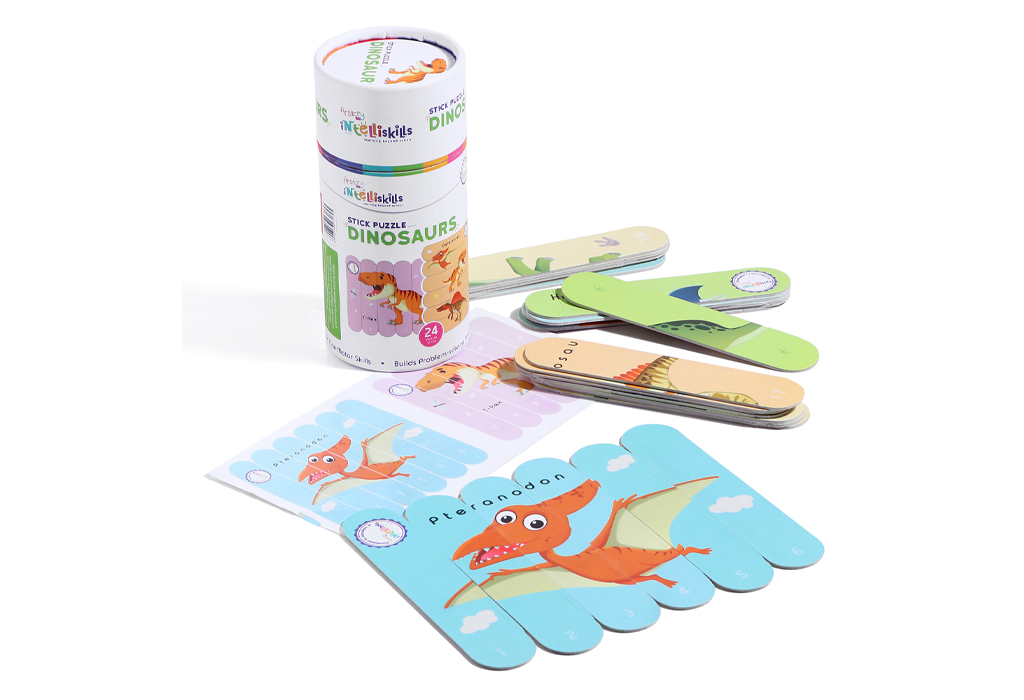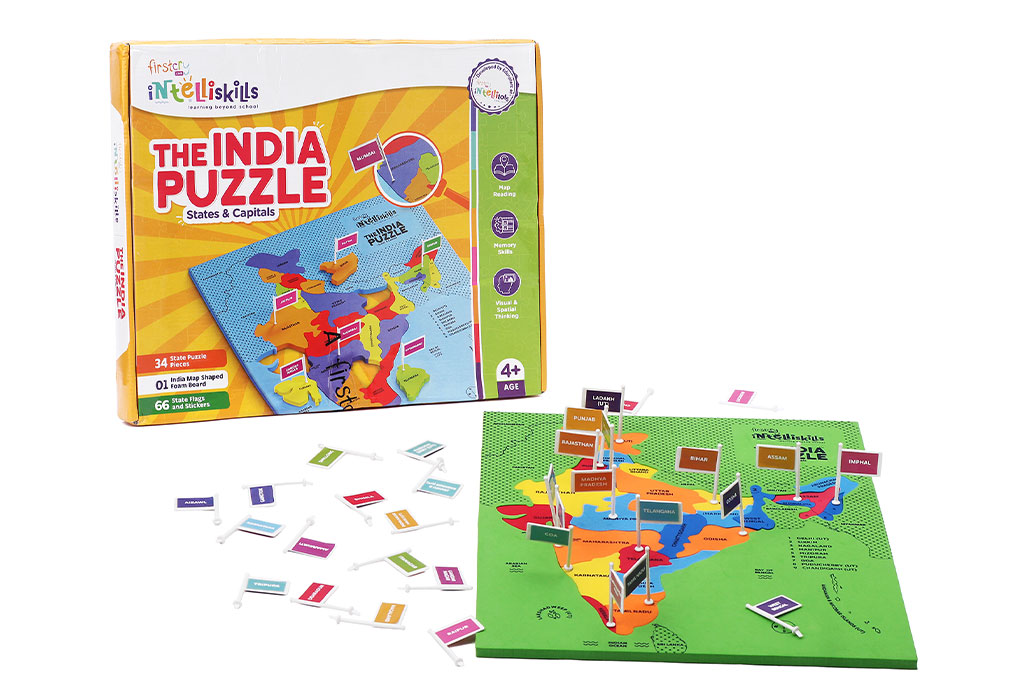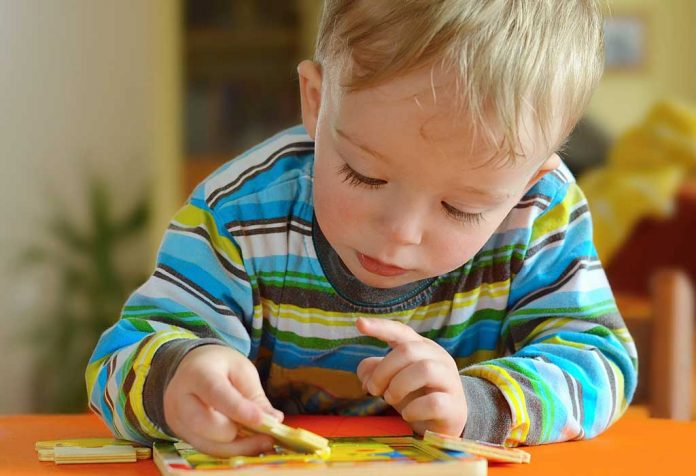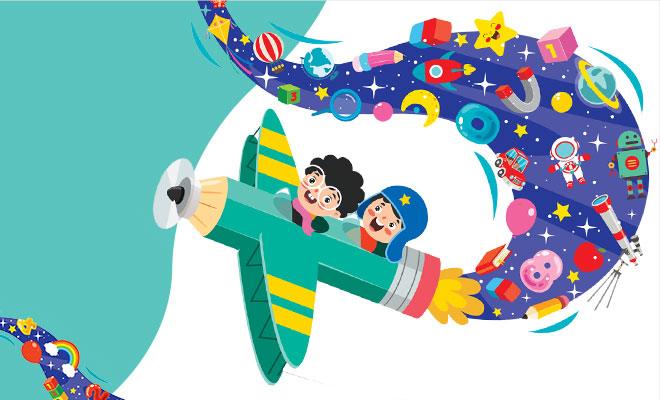Last Updated on October 19, 2023
If you are a parent to a small child, you already know what puzzle games mean to them and how much children enjoy it when they are playing with or solving puzzles. Children love to solve all kinds of puzzles, from simple, single shapes to complex ones. As a parent, you might only see these puzzles as fun toys that keep children entertained and occupied, but they actually hold some unimaginable benefits for young children. Before reading about these benefits, let’s read what Ms Uma Kadali, an Intellitots curriculum team teacher, says about puzzles and when to introduce them to toddlers.
Thank you for reading this post, don't forget to subscribe!
What Are Puzzles & When To Introduce Them To Toddlers?
“Puzzles are logical games for children which challenge them to try different options before solving the problem and arrive at a solution,” says Ms Kadali.
She also says that puzzles can be introduced to babies around 20 months onwards, but they should contain big pieces and a maximum of a 2-piece puzzle to be built on a flat surface. As the age of your baby increases, the number of puzzle pieces increases too. It starts with a 2-piece puzzle to a 20-piece puzzle till the age of 4. The 4+ age group can solve puzzles with 20 to 80 pieces based on their understanding.
Alternatively, you can determine the right age for your child to play with puzzles when they grasp things, use a pinch grip, and pick things up between the thumb and forefinger. One thing to remember is to let your child be motivated to play with puzzles themselves!
Ms Kadali also suggests that a toddler must be shown how to solve the puzzle for the first time so that they can observe and repeat the same. Also, guide and correct them if they give up too easily while solving the puzzle!
Amazing Benefits Of Puzzles For Toddlers
1. Builds Problem-Solving Skills
Each piece of the puzzle is designed to fit in a particular place. The children test each piece to find its place, building their problem-solving skills.
2. Develops Critical Thinking
While the children try to find the right place for the puzzle piece, they use their minds to think about where the piece can fit, developing their critical thinking skills.
3. Improves Hand-Eye Coordination
Puzzles are an excellent way to make the children practice their hand-eye coordination. Playing with puzzles allows them to coordinate what the eye sees, what the mind wants to do, and what the hands can accomplish.
4. Enhances Fine Motor Skills
It is very important for children to practice muscle strength in their fingers to grasp easily, pick up, and hold on to things. Puzzles involve picking up pieces, grabbing them and placing them in the right spot, giving children a great opportunity to work on their fine motor skills.
5. Boosts Self-Esteem
When kids are able to complete/solve the puzzle on their own, it gives them a sense of accomplishment that they have achieved something on their own (independently), boosting their self-esteem.
6. Promotes Language Skills
While solving puzzles, children may ask for specific puzzle pieces, describing what they are looking for, like a piece with a circle on it or a blue-coloured rectangular piece. Therefore, solving puzzles gives children an opportunity to work on their language skills.
How To Choose A Puzzle For Toddlers?
- Pick something suitable for your child’s age and abilities.
- Go for bright, fun, and colourful puzzles of different shapes with pictures that can help engage your child.
- Make sure the puzzle pieces do not have sharp edges.
- Before taking the pieces out, talk to your child about the puzzle type and theme.
- Tell and show your child how to solve the puzzle. You can start and let them take the lead.
- Praise your child when they complete/solve the puzzle. You can also reward some sweet treats to them for their accomplishment.
Types Of Puzzles For Toddlers
Here is a list of some fun and common puzzle types suggested by Ms Uma Kadali that are ideal for toddlers:
- Peg puzzles
- Shape sorters
- Chunky wooden puzzles
- 2, 3, 4, 8 or 12-piece jigsaw puzzles
- Cube puzzles
- Puzzles with wooden boards
Puzzles For Toddlers
Looking for some puzzles for your little one? Click on the links given below, and your search will end here! Don’t forget to read about the amazing features of these puzzles that are mentioned below.
1. Stick Puzzles

Features
- Developed by expert educators.
- Bright, sturdy and amusing puzzles that allow children to indulge in prolonged and engaging play sessions.
- A fun way for children to work on their problem-solving skills and improve their concentration.
2. Jigsaw Puzzles

Features
- Developed by expert educators.
- Toddler-friendly puzzle sets that engage kids in a fun and screen-free play session.
- Easy-to-solve puzzles that introduce kids to jungle and ocean animals.
3. Magnetic Puzzle

Features
- Developed by expert educators.
- A puzzle with colourful magnetic circle pieces that engages kids in creative play sessions.
- A puzzle that acts like both a puzzle and a canvas for children.
4. Indian States Puzzle

Features
- Enhances problem-solving skills in children.
- Introduces kids to map reading.
- Improves overall cognitive development, visual thinking and spatial reasoning of children.
Puzzles are open-ended and imaginative and have numerous benefits for children. Piecing the simple puzzles together will not only keep your child busy but will also help them with the development of various skills. Unleash your child’s creativity and skills with puzzles. Shop now for a world of learning and fun!
Puzzles are open-ended and imaginative and have numerous benefits for children. Piecing the simple puzzles together will not only keep your child busy but will also help them with the development of various skills!!











